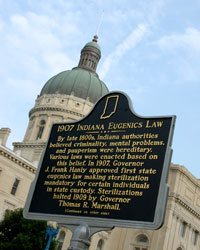Historical Marker
April 12, 2007, East Lawn of the Indiana State Library and Historical Building
across the street from the Indiana State House
12:30 PM - 1:00 PM
On April 12, 2007, an historical marker was dedicated to acknowledge and remember eugenics in Indiana. The historical marker presenting and discussing the succession of eugenic legislation in Indiana further enhances the visibility of the topic and denote its significance in the history of the state. In recent years, state governments have made official apologies to sterilization victims. Since 2002, California, North Carolina, Oregon, South Carolina, and Virginia have publicly issued apologies. Often these apologies have spurred healing for victims, promoted extensive historical research, and engaged community, legislative, and university dialogue. In Virginia, sterilization victims were directly engaged in the commemoration of Carrie Buck, the plaintiff in Buck v. Bell. North Carolina, through the Winston-Salem Journal, gave voice to victims, family members, historians and legislators through published testimonies. The prominence of the eugenics movement in Indiana warrants public display and debate about its lasting effects and consequences. To acknowledge the one hundredth anniversary of Indiana’s eugenic sterilization law, the historical marker is intended to heighten public awareness of this chapter of our past and prompt discussion about the future uses of science in society. (From Historical Marker Application, Eugenics Legislation in Indiana, Historical Background)

The text on the marker reads as follows:
Side One
By late 1800s, Indiana authorities believed criminality, mental problems, and pauperism were hereditary. Various laws were enacted based on this belief. In 1907, Governor J. Frank Hanly approved first state eugenics law making sterilization mandatory for certain individuals in state custody. Sterilizations halted 1909 by Governor Thomas R. Marshall.
Side Two
Indiana Supreme Court ruled 1907 law unconstitutional 1921, citing denial of due process under Fourteenth Amendment. 1927 law reinstated sterilization, adding court appeals. Approximately 2,500 total in state custody were sterilized. Governor Otis R. Bowen approved repeal of all sterilization laws 1974; by 1977, related restrictive marriage laws repealed.